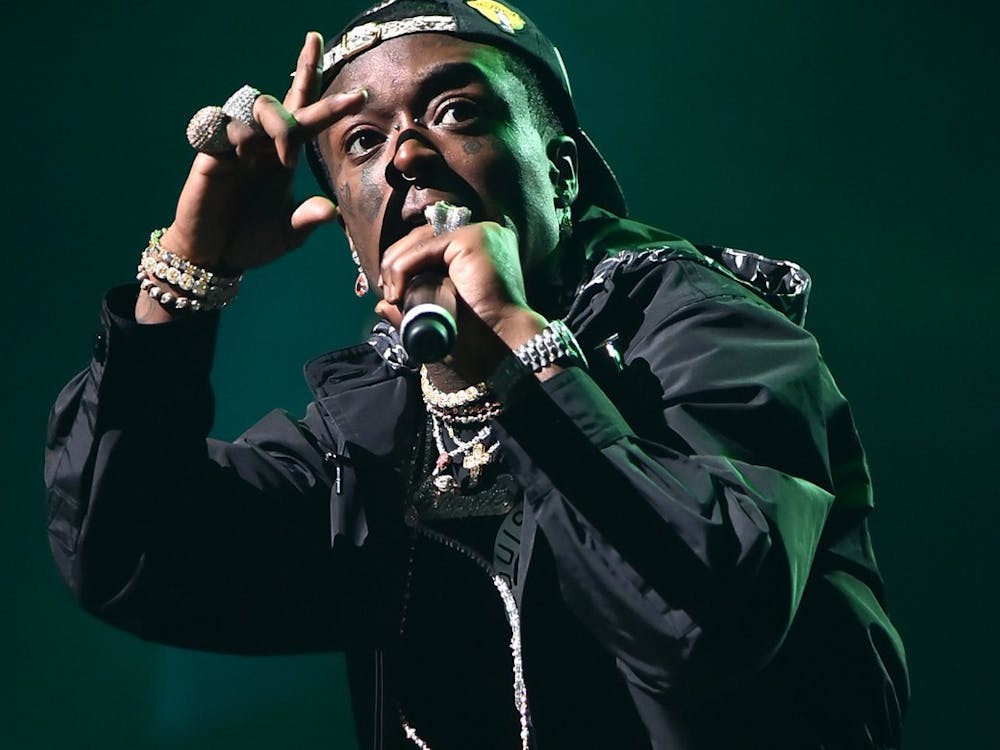It’s here. It’s actually here. After announcing and promptly disregarding multiple release dates, Lil Uzi Vert finally released his sophomore album “Eternal Atake.” Since announcing the project almost two years ago, Uzi has tortured his fanbase by systematically provoking hype, dashing it and placing the blame on his label. He created controversy, controlled it and ultimately used it purely to his advantage. In what may be the most ingenious album rollout of all time, Lil Uzi Vert fully developed the legend and legacy of “Eternal Atake” before anyone even heard it.
He announced the album in July 2018, posted a cult-themed cover art a few days later and subsequently released “New Patek” — the presumed lead single of the album — in perhaps the most iconic dance video ever posted on Instagram. The excitement for an album that invoked the legal wrath of a suicide cult was, of course, high. When he announced the album was finished in December, however, this era of good feelings was replaced by the psychologically grueling waiting period.
In the first weeks of 2019, Uzi announced his retirement from music, and fans had a collective mental breakdown. He described strife with his then-label Generation Now, which announced shortly afterward that Uzi had the power to release his album whenever he wanted. He never acknowledged this, and continued his “Free Uzi” campaign, eventually signing to Roc Nation. With Jay Z’s history of suffocating his artists, this move was akin to being annoyed that your hotel stopped serving breakfast at 10:30 a.m. and promptly moving into a gulag.
He went on to release two decent singles and continuously tinker with his project. In April, a collaborator revealed that Uzi had created 11 different versions of the album. He knew that fans love it when rappers complain about their contractual woes and deliberately lied to the world to buy himself a potentially endless creative gestation period.
In December 2019, after months of rumors and outlandish theories regarding the release date, he released the track “Futsal Shuffle 2020,” once again using the most effective weapon in his arsenal: Instagram dance videos. To Uzi fans like myself, these videos are so absurdly entertaining that “Eternal Atake”’s ideal form might actually have been a collection of him dancing with snippets playing in the background. Hype for the album was cautiously mounting.
After allowing his fans to choose his album cover and releasing a final single, he dropped the album, which runs for 62 minutes over 18 songs. According to this Twitter interaction, the album is divided into three equal parts, with each portion devoted to a different alter ego. The first third is Baby Pluto (thusly named for his artistic similarities with Future), packed with songs that sound like the indomitable 2015-era Future, if his voice was 3 octaves higher and his misery was slightly better hidden. Also like a majority of Future’s music, Baby Pluto suffers from homogeneity, which would be a larger problem if it was longer than six songs.
The second third is Orenji, named after a lighter and more unique character. It is both poppier and more sonically interesting than Baby Pluto. All six of the songs are unique but tied together by a trademark group of flows, which he cycles through at a head-spinning rate with impressive control. On this section, and pretty much only on this section, Uzi sounds interested in making music, like he remembered why he started in the first place and has recommitted himself to his career.
The final section is simply titled Lil Uzi Vert, and plays like an ode to both the profoundly chaotic road to “Eternal Atake”’s release and the artist he was before “XO TOUR Llif3,” which is essentially rereleased with the track “P2.” He indulges himself here, doing whatever sounds entertaining, like paying homage to the Backstreet Boys or allotting the only feature on the entire project to an R&B and soul classicist who, confusingly, also mixed Tyler, the Creator’s breakout “Yonkers.” It’s pressureless, and Uzi sounds like he’s having fun, which is what makes this section so vibrant.
Uzi’s music has always required little effort or participation from the listener, which gives him such mainstream appeal. His music is catchy and works straight out of the box, meaning the first time you hear one of his songs, you like it as much as when you hear it for the 40th time. He usually lays it all on the line, but on “Eternal Atake,” he is genuinely bending over backward to appease his fans. The fact that his three distinct personas are on full display identifies this album as an apology.
“Eternal Atake” is a sampler, designed to cater to everyone who has ever enjoyed an Uzi song equally. No matter what you like about his music, there is something in the album for you. It’s an impressive feat, given there is still a strong sonic identity across the project, but listeners find themselves wondering if this album, which essentially is just a peace offering to his fans, was worth the wait.
Fans went through enormous pain and frustration, but we stuck with it because ultimately we believed “Eternal Atake” was going to be Uzi’s magnum opus. Instead, we got an hour of 100% safe aux music and a piece of paper on which he wrote “I Sorry” in purple crayon. On one hand, we did not want safe. But, on the other hand, no artist on earth is capable of making an album that could universally live up to “EA”’s hype. “Eternal Atake” was and will forever be more about the journey than the destination, but the destination does have slappers.
Get The Chronicle straight to your inbox
Sign up for our weekly newsletter. Cancel at any time.

